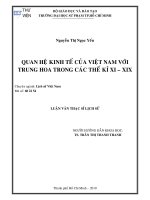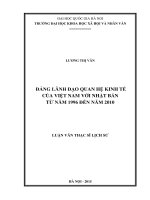Quản trị kinh doanh luôn là một trong những ngành hấp dẫn các bạn trẻ năng động, đặc biệt trong xu thế hội nhập kinh tế Quốc tế của Việt Nam những năm gần đây. Việc tìm hiểu rõ về ngành Quản trị kinh doanh giúp bạn định hướng nghề nghiệp tốt hơn trước kh
Bạn đang xem bản rút gọn của tài liệu. Xem và tải ngay bản đầy đủ của tài liệu tại đây (721.89 KB, 11 trang )
Chapter 6
Courage and Moral Leadership
1
Chapter Objectives
Combine a rational approach to leadership with a
concern for people and ethics.
Recognize your own stage of moral development
and ways to accelerate your moral maturation.
Apply the principles of stewardship and servant
leadership.
Know and use mechanisms that enhance an
ethical organizational culture.
Recognize courage in others and unlock your own
potential to live and act courageously.
2
Ex. 6.1 Comparing Unethical
Versus Ethical Leadership
The Unethical Leader
Is arrogant and self-serving
Excessively promotes selfinterest
Practices deception
Breaches agreements
Deals unfairly
Shifts blame to others
Diminishes others’ dignity
Neglects follower
development
Withholds help and support
Lacks courage to confront
unjust acts
The Ethical Leader
Possesses humility
Maintains concern for the
greater good
Is honest and straightforward
Fulfills commitments
Strives for fairness
Takes responsibility
Shows respect for each
individual
Encourages and develops
others
Serves others
Shows courage to stand up
for what is right
3
Ex. 6.2 How to Act Like a Moral
Leader
1.
2.
Develop, articulate, and uphold high moral principles.
Focus on what is right for the organization as well as all
the people involved.
3. Set the example you want others to live by.
4. Be honest with yourself and others.
5. Drive out fear and eliminate undiscussables.
6. Establish and communicate ethics policies.
7. Develop a backbone – show zero tolerance for ethical
violations.
8. Reward ethical conduct.
9. Treat everyone with fairness, dignity, and respect, from the
lowest to the highest level of the organization.
10. Do the right thing in both your private and professional life
– even when no one is looking.
4
Moral Leadership
Distinguishing right from
wrong and doing right;
seeking the just, honest, and
good in the practice of
leadership
5
Ex. 6.4 Three Levels of Personal
Moral Development
Level 3:
Postconventional
Level 2:
Conventional
Level 1:
Preconventional
Follows rules to avoid
punishment. Acts in own
interest. Blind obedience
to authority for its own
sake.
Lives up to
expectations of
others. Fulfills duties
and obligations of
social system.
Upholds laws.
Follows internalized universal
principles of justice and right.
Balances concern for self
with concern for others and
the common good. Acts in
an independent and ethical
manner regardless of
expectations of others.
6
Ex. 6.5 Continuum of LeaderFollower Relationships
Stage 1
Control
Authoritarian
manager
F
Passive
Stage 3
Empowerment
we
o
l
ol
r
Participative
manager
Selfresponsible
contributors
Team
players
Stewardship
-empow.
leader
Obedient
subordinates
Control Centered in the
Leader/Organization
Stage 4
Service
Whole
employees
er
ad
Le
Active
Stage 2
Participation
Servant
leader
Control Centered in
7 Follower
the
Stewardship
A belief that leaders are deeply
accountable to others as well as to the
organization, without trying to control
others, define meaning and purpose for
others, or take care of others.
8
Servant Leadership
Leadership in which the
leader transcends selfinterest to serve the needs of
others, help others grow, and
provide opportunities for
others to gain materially and
emotionally
9
Courage
The ability to step forward through fear
10
Whistleblowing
Employee disclosure of
illegal, immoral, or
unethical practices in the
organization
11









